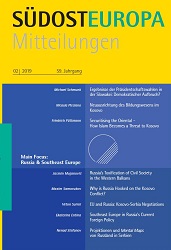Why is Russia Hooked on the Kosovo Conflict?
Why is Russia Hooked on the Kosovo Conflict?
Author(s): Maxim SamorukovSubject(s): Politics / Political Sciences, Geopolitics
Published by: Südosteuropa Gesellschaft e.V.
Keywords: Russia;Kosovo Conflict
Summary/Abstract: The Kosovo crisis was a pivotal moment for Russian foreign policy. In the late 1990s, Moscow decisively switched from cooperation to confrontation with the West. Frustrated by the West’s bypassing of the UN Security Council, Moscow began to use developments in Kosovo as aprecedent for pursuing its own interests in separatist conflicts in the post-Soviet space. Russia repeatedly referred to Kosovo as legal grounds for its recognition of Abkhazia and South Ossetia, and its annexation of Crimea in 2014. When Kosovo proclaimed independence in 2008, Moscow stood firmly in favour of Serbia’s territorial integrity. Since then Russia has cultivated its image as the main protector of Serbia’s interests in the international arena. This has allowed Moscow to acquire an unprecedented degree of influence in the Serbian energy sector and domestic politics. Moscow now largely controls Belgrade’s position on Kosovo and can subvert the authority of any Serbian politician if he or she is seen as being too soft on Pristina. Russia is reluctant to accept any final settlement of the Kosovo status, fearing this would lead to Serbia’s accession to NATO and the elimination of Russia’s security role in the region. The Kosovo conflict does not affect any of Russia’s vital strategic and economic interests. But Moscow views the dispute as an integral part of its relations with the West. European leaders could appease its hostility to any settlement by displaying greater willingness to take Russian concerns into account.
Journal: Südosteuropa Mitteilungen
- Issue Year: 2019
- Issue No: 02
- Page Range: 57-62
- Page Count: 6
- Language: English
- Content File-PDF

